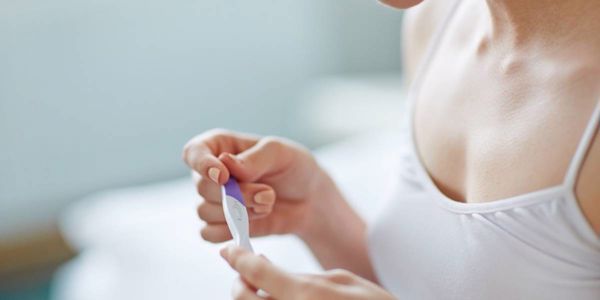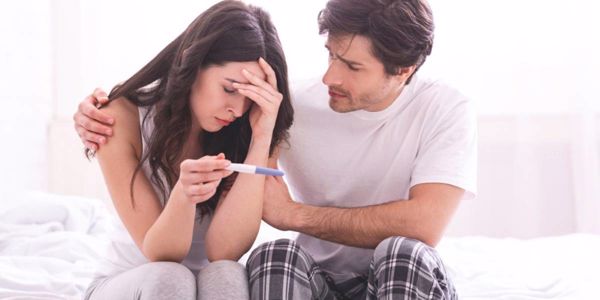Sometimes getting pregnant isn’t as easy as ditching your contraceptives and having lots of sex. For some, it can happen by accident, sometimes, it happens with a little trying, and for a few, it sadly might not happen for a while, or at all. For 1 in 7 couples, fertility can be a huge obstacle in the way of your hopes and dreams of having children. It can affect both men and women and can be a very isolating time.
If you have any doubts about your or your partner’s fertility after you've been trying for a year, you are both able to make an appointment with your GP to discuss fertility and put your mind at ease or give you the help you need. This gives you a clearer picture of the road ahead, and the confidence you need to overcome any obstacles in your way, together.
Here are some of the main physical conditions that can impact female fertility:
Pelvic Inflammatory Disease (PID)
Any infection affecting the pelvic organs is referred to as PID. It most commonly affects the fallopian tubes; however, it can also affect the uterus and the ovaries. Its most common triggers are sexually transmitted diseases (STDs) such as gonorrhoea and chlamydia that have gone untreated for a prolonged period.
Symptoms can include pelvic pain, unusual vaginal discharge, excessive bleeding during your period, chills, fever, pain when urinating, backache, sickness, and nausea. PID, unfortunately, can quite often go undiagnosed, as the symptoms are so generic to many other issues.
NHS studies have found that 1 in 10 women who suffer from PID experience fertility issues, as it can be left untreated for so long that it can cause scarring to the fallopian tubes. This makes it difficult for the egg and sperm to travel up or down to reach each other. If they do meet, and the egg is fertilised, the scarring can also prevent it from travelling to the uterus and increases the risk of an ectopic pregnancy.
To prevent PID from developing, regularly test for STDs, follow safe sex practices, and treat any contracted infections/diseases immediately. To treat PID once diagnosed, your GP can give you antibiotics to fight off the infection and protect your fertility, however, once the tubes are damaged, this sadly cannot be reversed.
You can, however, have surgery to remove or repair your fallopian tubes, or you can undergo IVF to ensure the fertilised egg bypasses the tubes and implants directly into the uterus.
Fibroids
Fibroids within the uterus are non-cancerous (benign) tumours. They can grow in clusters and can be super small or as big as your head. 1 in 3 women in the UK suffer from fibroids, 33% of these experience symptoms such as long, heavy, painful periods, pressure in the pelvic region, and constipation, though many women do not experience any symptoms at all. The cause of fibroids is unknown but are more common among women who are overweight. Afro-Caribbean women are also more likely to develop them than Caucasian women. You can also be at a higher risk of developing fibroids if your mother had them.
Fibroids don’t always affect fertility and, in fact, can just be left alone, however, in some cases, when they develop within the uterus, they can get in the way of conception by blocking an egg from being fertilised and preventing a fertilised egg from implanting. It’s important to note that their size and position ultimately determines whether they will impact your fertility.
It is possible to remove them in a procedure called a 'myomectomy', where a large fibroid or cluster of them can be removed from the uterus and can either be done in an inpatient or outpatient situation.
Endometriosis
Around 10% of females of reproductive age suffer from endometriosis globally. It occurs when tissue from the uterine lining starts growing on another part of the pelvic area, such as the fallopian tubes, bladder, appendix, ovaries, or even the intestines. As it is the same tissue as found in your uterus, it will build up and shed in the absence of pregnancy each month, causing scarring and inflammation. Symptoms include extreme pelvic pain, severe cramps, lower back pain during sex, nausea, and vomiting.
The cause is thought to be a combination of factors. It’s thought the immune system malfunctioned and rather than flowing out with your period, the backup of uterine tissue instead headed the wrong way back into the abdominal cavity. It’s also thought that genetics play a role in determining whether you will develop it.
In most cases, fertility is not affected, however, there are a few cases where women who suffer from endometriosis have fewer viable eggs due to the condition, or the surgery to fix it caused internal scarring of the ovaries. There is no cure, however, there are several treatments that can help with possible fertility issues. These include surgery to remove the endometrial lesions, fertility medications in conjunction with IUI, and finally, IVF, which offers the best chances.
Polycystic Ovarian Syndrome (PCOS)
Up to 10% of women suffer from PCOS and is the most severe cause of infertility. Polycystic ovarian syndrome occurs when your body produces too much luteinising hormone (LH) and the ovaries begin producing mass amounts of testosterone, or the body becomes too sensitive to normal levels of testosterone. This then prevents the ovaries from releasing eggs, which, of course, means the egg cannot be fertilised. PCOS typically occurs in women who are carrying a bit of extra weight or are pre-diabetic, typically have irregular periods or no periods at all, or may experience excessive hair growth and acne on the face.
It’s thought that PCOS has a genetic component, meaning if you have a close female relative that suffers, you may be at higher risk yourself. It could also have something to do with your body’s insulin levels, and whether it’s used properly.
Women can reverse the effects of PCOS through weight management to regulate and restore normal ovulation and periods. Otherwise, your doctor can prescribe medication to aid ovulation, and IVF is always possible to help make pregnancy a reality.
Ovarian Cyst
Fluid-filled sacs can grow in the ovary and are known as ovarian cysts. These blister-like growths can come and go for many women and can be completely harmless. For some, however, these cysts can hang around, double in size, and start causing problems. Most common symptoms include pain localised in the lower abdomen, and irregular periods.
If too many cysts form or grow too large, eggs could struggle to develop or release and prevent ovulation. Some cysts, called 'endometriomas', can even destroy the tissue in your ovaries and decrease the number of eggs you carry. Often however, cysts can sort themselves out, but if they persist or grow, you may need surgery to remove them.
Irregular Menstrual Periods
Cycles lasting more than 35-40 days, no periods at all, or abnormal bleeding constitute as ‘irregular periods’ or ‘anovulation’ and can all point to the possibility you may not be ovulating at all, and thus are unable to fall pregnant. It is responsible for up to 30% of all cases of infertility. This can be caused by several factors, including stress, eating disorders, being extremely under/overweight, illness, and/or a hormonal imbalance.
Once it has been confirmed by your doctor that you aren’t ovulating, they will look at your health and lifestyle to spot any contributing factors to your anovulation. Reducing stress and getting your weight closer to a ‘healthy’ level can regulate your cycles, however, any extreme weight gain or loss can throw your cycles off balance further. Aim to lose no more than 1-2lbs per week to lose weight safely. If this doesn’t work, there are fertility treatments and further tests that can be done to see if there is a deeper root cause.
Male infertility also makes up 30% of all UK infertility cases, so be sure to get your partner checked out too for low sperm count, low sperm mobility, chlamydia, or any other potential causes.







